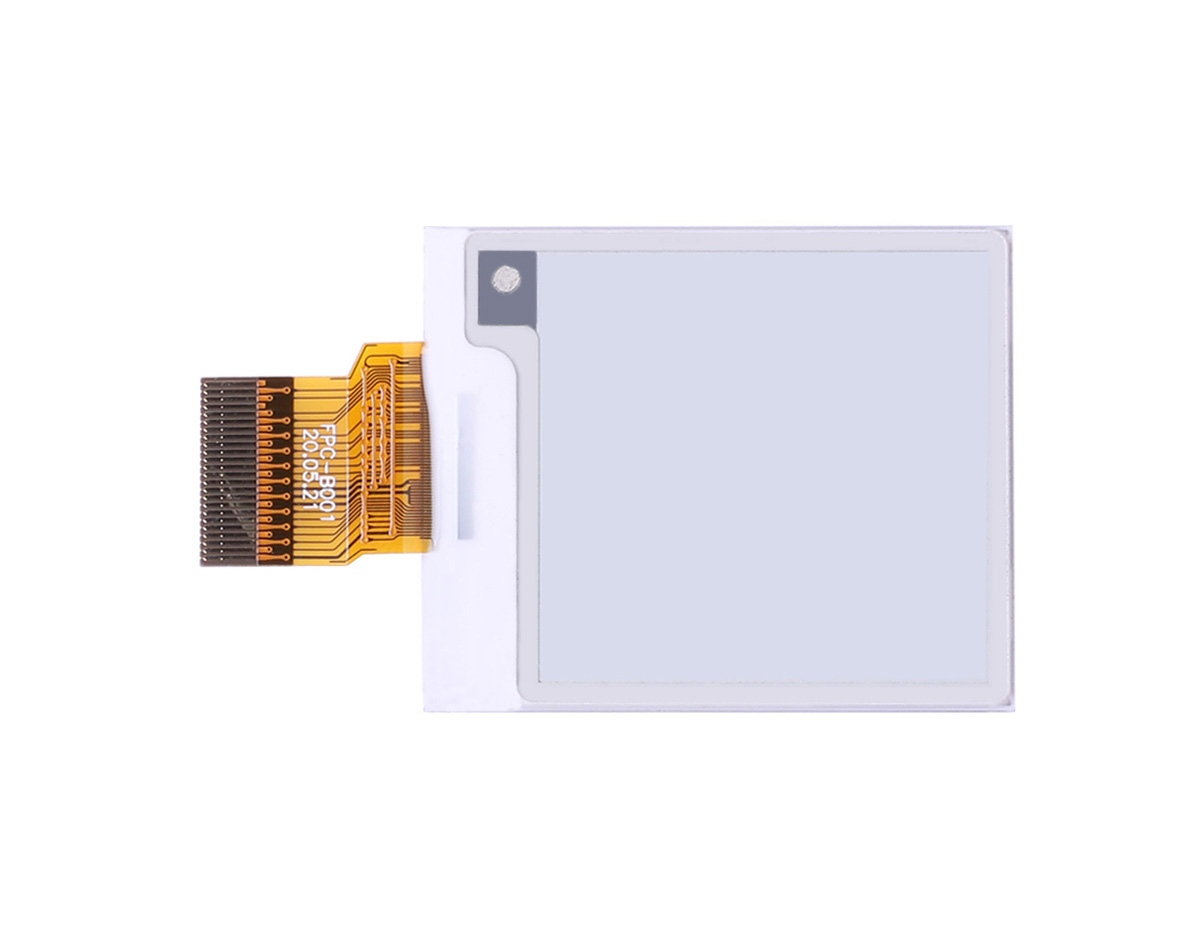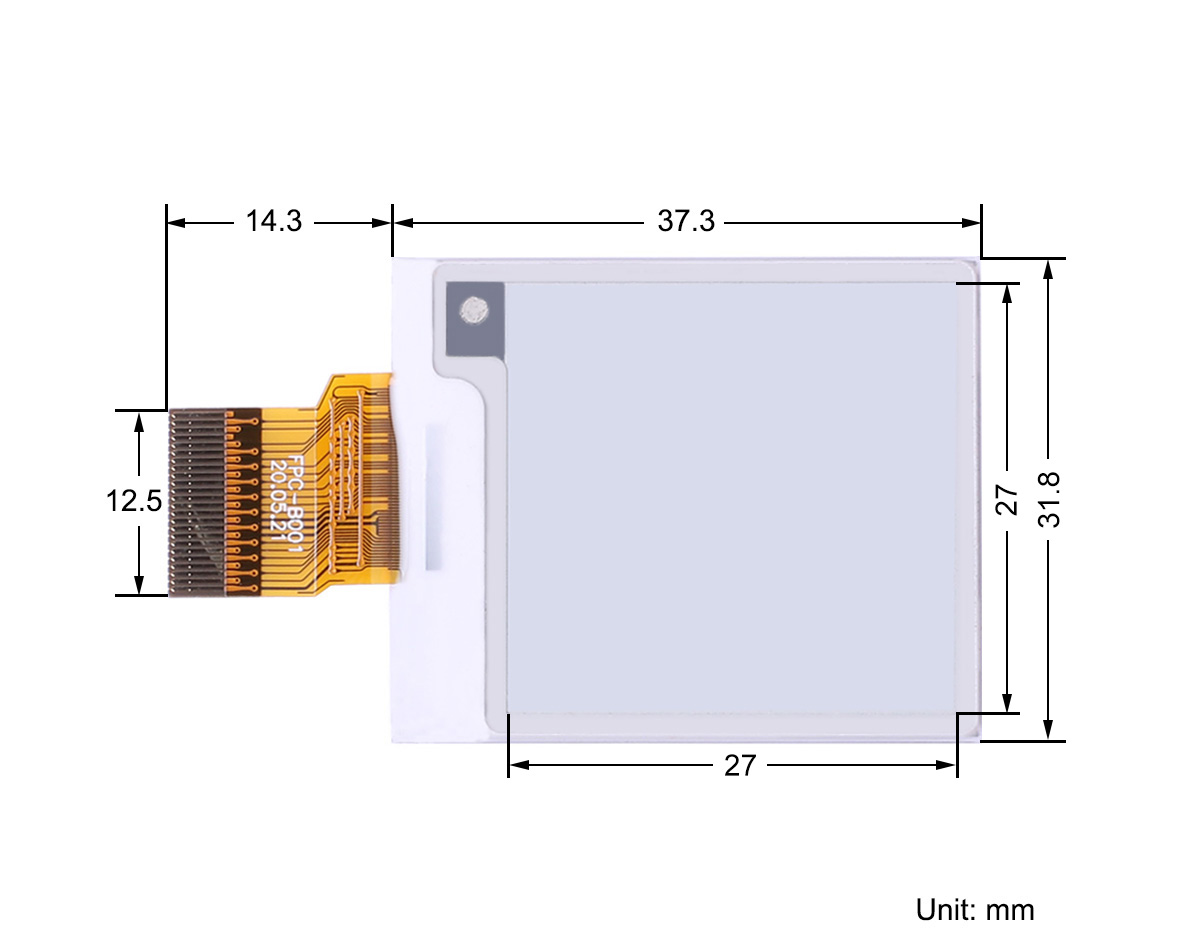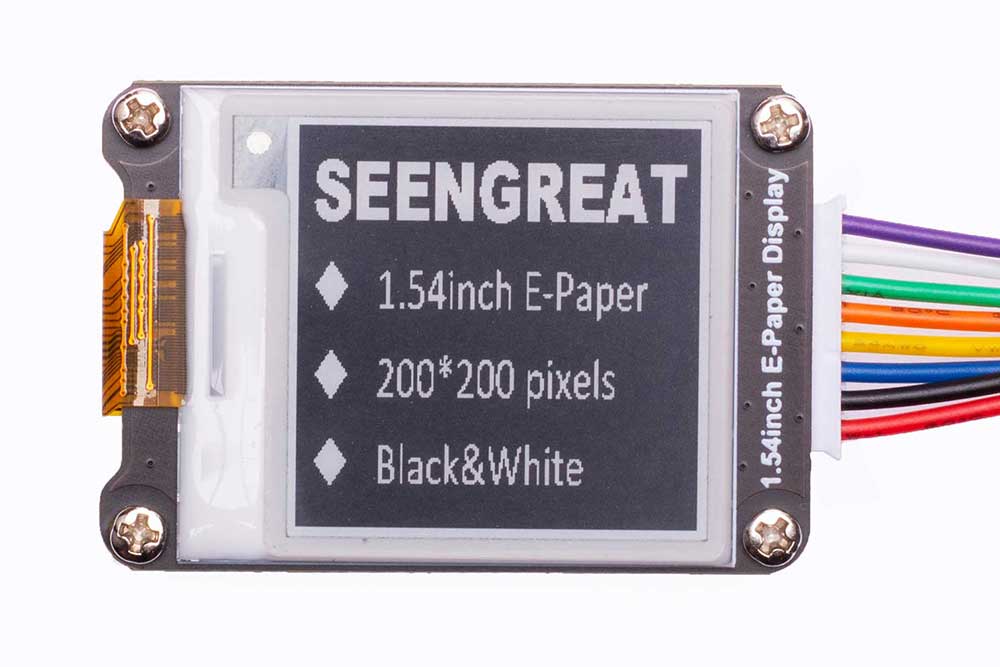
Product Overview
This e-paper display can showcase black and white colors. With a resolution of 200 x 200, it communicates via the SPI interface and supports partial refresh. Due to its advantages such as ultra-low power consumption, wide viewing angles, and the capability of maintaining displayed content without power, it is an ideal choice for applications such as shelf labels and industrial instruments.
Application
Suitable for electronic book readers, electronic price tags, industrial and logistics labels, digital signboards, billboards, conference name tags, electronic notebooks, etc.
Product Features
- No backlight required; the last updated display content can be maintained for a long time even when power is off.
- Ultra-low power consumption; power is only consumed during refresh.
- Wide viewing angle; the viewing angle is greater than 170°.
- Reflective display; it does not emit light on its own.
Product Parameters
| Operating Voltage | 3.3V |
| Dimensions | 37mm x 31.8mm |
| Display Dimensions | 27mm x 27mm |
| Pixels | 200 x 200 |
| Display Colors | Black and White |
| Communication Interfaces | SPI |
| Grayscale | 4 |
| Operating Temperature | 0℃~50℃ |
| FPC Interface | 0.5mm pitch 24 Pin |
| Display Orientation | Landscape, Portrait |
| Full Refresh Time | 2s |
| Fast Refresh Time | 1.5s |
| Partial Refresh Time | 0.26s |
| Power Consumption | 4.5mW |
| Standby Power Consumption | 0.003mW |
Explanation of the Refresh Processes (Refresh time: The entire process from the screen's movement to stable display)
- Full screen refresh: During the refresh process, the screen will flicker multiple times.
- Fast refresh: During the refresh process, the screen will flicker once.
- Partial refresh: During the refresh process, there will be no screen flicker.

Product Advantages
The electronic paper utilizes "Microencapsulated Electrophoretic Display" technology for image display. Its working principle involves the migration of charged nanoparticles suspended in a liquid under the influence of an electric field. Under ambient light, it forms a display effect similar to traditional printed paper through reflection. After refresh, it does not require power supply and can retain the displayed image for a long time. Electronic paper can display images clearly under various ambient light conditions such as artificial light or natural light. It does not require a backlight, and the viewing angle is nearly 180°, comparable to traditional paper's display effect. It is commonly used in applications such as e-readers and labels.
Usage
Use with the E-Paper Driver Board
This product can be used with our e-paper driver board (which users need to purchase separately). The e-ink screen is suitable for platforms such as the Raspberry Pi series, Arduino, STM32, etc. We provide example programs in C and Python for Raspberry Pi, as well as example programs for Arduino and STM32. These example programs can draw points, lines, rectangles, and circles, and can also display English letters, numbers, and images.
E-Paper Driver Board Description
For detailed parameters and usage methods of this e-ink screen, please refer to the datasheet document on the WIKI of this product.
For more information on the Seengreat brand driver board, please visit our company's homepage: https://seengreat.com.
How to Use the E-Paper Driver Board
If you already have the e-paper driver board, please visit the following address to view more detailed information about the driver board: https://seengreat.com/wiki/
Use of the Built-in Screen Driver Board
If you want a more convenient option, you can also browse our E-Ink Display HAT. With this product, we have combined the 1.54-inch electronic paper with the drive module, making it more convenient and efficient for users.

Resources
FAQ
What is the refresh count of the e-ink screen/what is its lifespan?
Under ideal conditions and normal use, it can be refreshed up to 1,000,000 times (1 million times).
Question: After using for some time, severe ghosting occurs during screen refresh (full refresh) and cannot be repaired?
After powering the development board for an extended period, it is recommended to set the screen to sleep mode or directly cut off power after each refresh operation. Otherwise, the screen may be damaged when it is kept in a high-voltage state for an extended period.
Question: Can the e-ink screen be refreshed again after entering deep sleep mode?
Yes, but it requires performing e-paper initialization operations using software.
Question: Why is there image offset during display?
- It may be due to the SPI rate being too high, resulting in data loss. Try reducing the SPI rate.
- Insufficient power supply or unstable power supply can lead to data loss.
- Data lines that are too long can result in data loss; it is best not to exceed 20cm for the length of the line.
